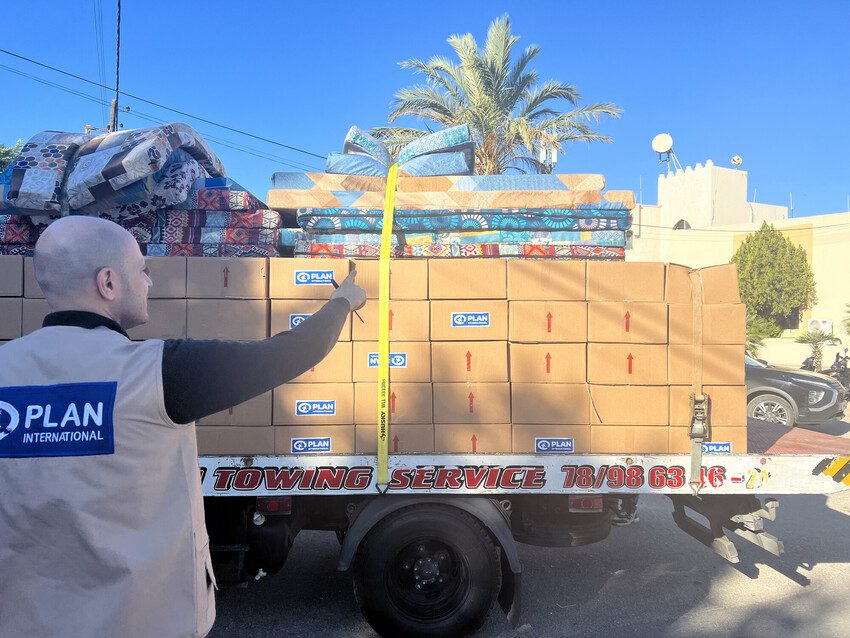Gaza 100 days on: Stop the War on Children
17 January 2024Children never start wars, but suffer the most, blogs Dr Unni Krishnan as we reach 100 days of war in Gaza.

The killing of 10,000 children. Blasts leading to amputation—sometimes carried out without anaesthetics—and lifelong disabilities. Entire populations, including pregnant women and children, facing hunger, a quarter of them (576,600 people) at catastrophic levels, – that means at the risk of starvation and death. Warnings from the UN children’s agency that nearly 335,000 children under five in the Gaza are at “high risk of severe malnutrition and preventable death”. Thousands of children buried under the rubble and presumed dead.
The balance sheet of 100 days of war on Gaza is grim. It is a dark moment in history that we see on our television screens.
“If there is a hell on earth today, its name is northern Gaza,” in the words of one senior UN official. Testimonies from children, eye-witness accounts and news reports narrate in graphic detail and superlative what is in all probability an unprecedented levels of cruelty towards children.
Health workers killed
Bombing by Israeli forces has hampered the work of hospitals and health care systems in Gaza. Incubators have been shut down for lack of oxygen supplies with the power supplies snapped and fuel blockaded. More than 300 health workers have been killed.
A generation of children are beginning their lives in an unending nightmare, driven out of their bombed-out homes and ramshackle shelters and tents again and again. Picture a reality in this scenario – 1,000 children who have lost their limbs in the war, struggling to move as fighter jets fly over their head. Children who have lost mobility are often more prone to mental health and psychosocial challenges.
This is not a war on Gaza anymore. This is a war on children and humanity at large. The sobbing of children orphaned by the war and the mothers who have lost their loved ones should be a call for action, a loud siren for humanity to do whatever it takes to stop this unjust war on children.
When parents, friends, siblings and grandparents are killed, nothing is ever the same again for any child. This war has filled hospital wards with a heartbreaking category of young victim: ‘wounded child, no surviving family’ (WCNSF). The act of injuring and maiming children must stop. The combined weight of the coffins that carry the young bodies is a dent on humanity.
We are running out of words, but not options.
It must stop.
There are no winners in wars. It is humanity that loses out as is evident from 23,968 people killed in Gaza (mostly women and children) and 1,200 (including thirty six children) killed in Israel since 7 October 2023.
Psychological impact of war on children
The catastrophic psychological impact of war continues to haunt children and their care givers and families even when fighting stops. If you are a child living in Gaza, war or conflict in 2006, 2008, 2012, 2014, 2021 and now since October 2023 will all have left a mark on your mind. I have seen first-hand the inexplicable brutality of war, and the impact of weapons on children in Gaza and other war zones during my humanitarian missions. I have also witnessed the determination of children in Gaza to beat despair. However, there is only so much that young minds can take.
In previous wars and conflicts, we have seen the determination of mothers who have marched on the streets, artists who have painted graffiti, students who have lit thousands of peace candles.
What can you do when you are thousands of miles away? Learn from history. Ensure adherence to the rules of war and International Humanitarian Law until the fighting stops. Ensure that no child is held hostage. Stop the supply of weapons. Guarantee free movement of medical, relief and humanitarian supplies and personnel through all access points. Stop attacking hospitals, schools and places of worship and refuge. Stop killing doctors, health and humanitarian workers. Stop the massacre of thousands of children and other civilians in Gaza. A compassionate approach towards children that prioritises their protection, and life-saving assistance, is the starting point. Most importantly, recognising that children never start wars, but suffer the most.
As Nelson Mandela famously said “What counts in life is not the mere fact that we have lived. It is what difference we have made to the lives of other.”


